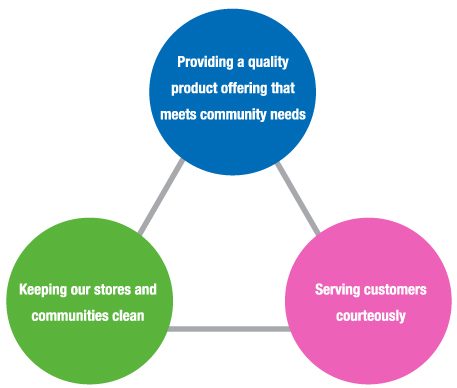SUSTAINABILITY Customer Relations
Efforts to Achieve Customer Satisfaction
Basic Concept
The Lawson Group aims to create stores that continue to be supported by customers in their local communities in the hope of realizing its Group Philosophy, “Creating Happiness and Harmony in Our Communities.” In order to improve customer satisfaction with our stores, we have adopted the Three Essential Practices as our basic principles for store management. In addition to these three principles, we are working on product development and store development with an emphasis on improving our product offering and opening stores in formats that suit the community.

The Three Essential Practices: Improving Customer Satisfaction
Our store operations are founded on the Three Essential Practices: (1) providing a quality product offering that meets community needs; (2) keeping our stores and communities clean; and (3) serving customers courteously.
This means that in order for customers to feel comfortable visiting our stores, each store should have a deep understanding of the customers in its commercial area and offer a product lineup that will please them (providing a quality product offering that meets community needs), while at the same time striving to improve customer satisfaction through clean stores (keeping our stores and communities clean) and serving customers courteously.
In order to improve the thoroughness of these three practices, headquarters not only provides guidance through supervisors (SV: Store Management Instructor), but also conducts various initiatives such as store health checks, in which undercover investigators quantitatively check each store from the customer's perspective.
1) Providing a quality product offering that meets community needsAchieve by analyzing point card data and improving ordering accuracy
Stores that operate throughout Japan based on small commercial areas address the needs of a variety of customers, with each store being different from the next. By analyzing point card data, we can learn more about the products that local customers are looking for, and by reducing the opportunity loss of products (i.e., the products that customers need but which are out of stock on the sales floor), we can increase customer satisfaction. The accumulation of these efforts will also lead to the reduction of food loss.

2) Keeping our stores and communities clean Promotion of environment beautification of our communities hand in hand with FC member stores and customers
We believe that by keeping the inside and outside of our stores clean, we can make our stores a place that customers will want to visit again and again, and that the efforts of individual stores will add up and lead to environmental conservation for society as a whole. The ideal store operation that Lawson is aiming for is one in which franchise owners, store crews, and headquarters employees can promote considerate actions toward society and the environment together with customers.

3) Serving customers courteouslyCommunicate the value of products to customers through customer service
Serving customers courteously is not only the basis for a pleasant shopping experience for customers, but also an opportunity to inform customers of the quality of our products. Particularly for over-the-counter fast food products such as in-store prepared food and freshly-brewed coffee, we train our employees with knowledge of product quality and the best ways to provide products to customers.

Store Health Checks, a System for Pursuing the Ideal Form of Store Management
With the aim of improving store operation levels, including the Three Essential Practices, undercover store investigators quantitatively check customer service, merchandise assortment, cleaning, and compliance items at each store from the customer's perspective, comparing them with those of neighboring stores. In addition, SVs at the head office and franchise owners work together to confirm the evaluations (opinions) of individual stores based on customer questionnaires, which are used to further improve the Three Essential Practices.
